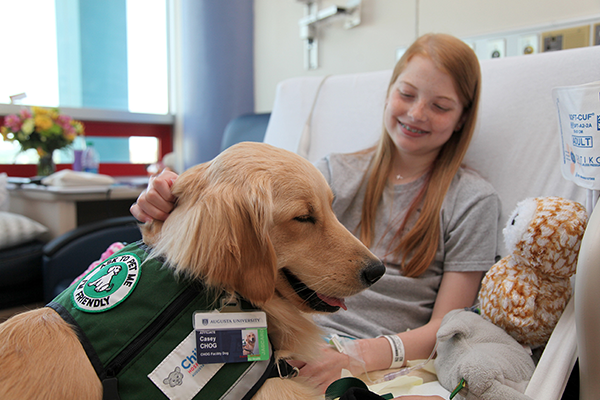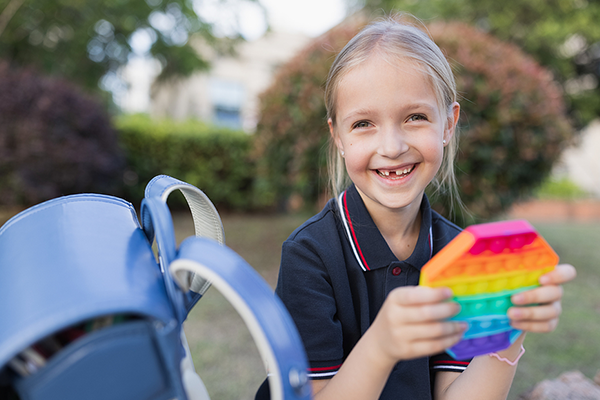She was a patient at the Children’s Hospital of Georgia, but today, she was just a girl with a dog.
“Hi, Nugget!” she said, and the golden retriever/lab mix puppy nuzzled her hand while she smiled.
Facility animals aren’t necessarily a new trend—many trained animal groups have regularly visited hospitals for years. But what is new is hospitals with on-staff facility animals whose job is to help make hospital stays fun—and to help children heal. Harleigh Turner, child life specialist and Nugget’s handler/mom, says that Canine Assistance, the organization that bred and raised Nugget, has placed around 50 dogs at facilities across the United States, most of them children’s hospitals.
Turner—whose mother was a guidance counselor who used facility dogs in her practice—completed a research project as a child life intern taking a look at the unique link between pets and healing: “It really shocked me that even back in hunter-gatherer societies, animals were believed to have healing powers and that for centuries, interacting with dogs has been found to benefit patient outcomes,” said Turner.
When playing becomes healing
Especially for a child in a hospital—and even for a child at home recovering from a long illness or injury, or with a chronic condition—a dog or other animal helps “normalize the environment, making it less threatening and a lot more fun,” said Turner. “Everyone knows what a dog is so even if a child doesn’t have a dog at home, he or she probably has a friend or teacher or someone in their lives with a dog. So just the sight of a dog has been shown to decrease anxiety.”
It seems like just playing—and it is. But taking it even further, snuggling and playing with a dog or other animal can have very specific physical benefits for a sick child:
Pain management:
The presence of a facility animal can actually decrease the need for pharmacological interventions for pain, said Turner, by helping to take a child’s mind and focus off of his or her pain. “I’ve seen even just 30 minutes snuggling with a dog make a child so much more comfortable and relaxed,” she said, “which puts a smile on my face, too.”
Treatment compliance:
Anyone who has ever tried to convince a sick child to take his or her medicine or to undergo an exam like an X-ray knows the struggle it can be. But having a dog or other pet nearby can help a child remain calm. “At a hospital, facility animals can even climb onto an MRI table to show a child that it’s not scary,” said Turner. This kind of “medical play” can extend to feeding an animal pretend medicine or explaining how anesthesia works by placing a mask over an animal’s face.
Getting up and walking after a procedure like surgery or after an extended illness or injury:
Understandably, children might be afraid to get up to walk after they’ve had a procedure or while recovering from an injury, even though it’s important for them to get up on their feet. “Just saying, ‘Will you come take Nugget for her walk? She hasn’t had her walk yet today’ can be motivation for a child—which is something parents can try at home too,” said Turner.
As a result, blood pressure levels go down and even heart rate decreases—along with anxiety, fear and those “scary feelings” that come when a child is sick or in the hospital.
Happier, healthier kids
Although Nugget is a “bit of a diva—she is the queen of the side-eye and a hoot and a half,” laughs Turner, “she is the biggest snuggler and the most relaxed dog. She loves to meet people and is a social butterfly.”
And that’s a big part of the job description for a facility animal: that winning personality, which can’t help but put a smile on children’s faces. “We call it animal-assisted emotional expression, and it’s a huge part of Nugget’s and my job,” said Turner.
She saw it recently in another child in the hospital who was missing her own dog at home terribly. “Nugget wasn’t playing—she was giving her that tactile component. In other words, she just crawled up into bed and into her lap,” said Turner. “Her little face just lit up, and she said, ‘Look, Nugget is squirreling up in my lap like my dog does at home.’
“Nugget was filling a void the patient needed. We all know that medical interactions cause stress, no matter what age you are. Dogs and other animals like Nugget can be a wonderful coping tool that helps children feel so much more comfortable and happier, even while they’re sick.”
For more information about our child life specialists and facility dog program, visit augustahealth.org/kids or call 706-721-KIDS (5437).
If you are interested in becoming a Child and Adolescent Life Specialist or would like more information about the profession, visit www.childlife.org.




